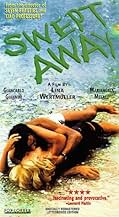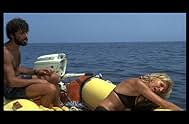Vers un destin insolite sur les flots bleus de l'été
Original title: Travolti da un insolito destino nell'azzurro mare d'agosto
IMDb RATING
7.5/10
7.1K
YOUR RATING
A trip into the Mediterranean sea becomes a trip into the discovery of how society's frameworks of the rich and poor are delicate and temporary.A trip into the Mediterranean sea becomes a trip into the discovery of how society's frameworks of the rich and poor are delicate and temporary.A trip into the Mediterranean sea becomes a trip into the discovery of how society's frameworks of the rich and poor are delicate and temporary.
- Awards
- 4 wins & 4 nominations total
Featured reviews
I feel that many of the comments for 'Swept Away...' slightly miss the point. Certainly, it is about politics. But Wertmuller is not taking sides between her communist & capitalist heros. She is examining what happens when they are removed from the society that defines their roles and their relationship.
Once the balance of power is reversed, they essentially change places. He becomes dominant (and often abusive). She becomes weak and submissive. The rough sex, etc. is all symbolic of how the poor are treated by the rich. And Wertmuller shows us that the 'working class hero' has no inherent nobility. Put in the position of power, he is every bit as cruel as his former oppressors. Once they return to society, the balance of power is once again reversed.
The message here is that there are no political heros and villains. Power is relative and arbitrary. And sadly, it is our nature to abuse it. The lesson is, perhaps, that we must rise above that base instinct and treat our fellow men with empathy and generosity. "We have met the enemy, and he is us."
Once the balance of power is reversed, they essentially change places. He becomes dominant (and often abusive). She becomes weak and submissive. The rough sex, etc. is all symbolic of how the poor are treated by the rich. And Wertmuller shows us that the 'working class hero' has no inherent nobility. Put in the position of power, he is every bit as cruel as his former oppressors. Once they return to society, the balance of power is once again reversed.
The message here is that there are no political heros and villains. Power is relative and arbitrary. And sadly, it is our nature to abuse it. The lesson is, perhaps, that we must rise above that base instinct and treat our fellow men with empathy and generosity. "We have met the enemy, and he is us."
Back in the 1970's Lina Wertmuller was an art-house superstar. But more importantly, she was a first class original, bursting with a fresh, exciting vision.
Now, here's a lively storyline: a rich, racist, reactionary female- a right wing, fascist mind in a knuckle-biting, voluptuous body -is stranded on a mid-sea desert isle with a poverty-stricken, chauvinistic, Communist male- a left-leaning propagandist in a scrawny masculine body. "Make nice" they don't. Well, not right off the bat. Not before much nasty invective and grievous bodily assault take place. But then afterward....ahh, afterward.
SWEPT AWAY, though a foreign film, is in the manic, irreverent, well-timed tradition of Hollywood screwball comedies like THE AWFUL TRUTH(1937), MIDNIGHT(1939), THE LADY EVE(1941), and most emphatically, HIS GIRL FRIDAY(1940)- only with a shipload more profane repartee, orgiastic lust, and bone-crunching physicality than was ever permissible or desirable in those older classics. Throwing all vestiges of caution to the four winds, Wertmuller really surprises the viewer with her take on the battle of the genders strained through a volcanic political dialectic.
Upon its initial release many in the audience demurred strongly (and still do) as the male's dominance slipped into outright brutality. Certainly, Wertmuller can be accused of going too far, but never of boring us. Giancarlo Giannini and Mariangelo Melato are absolutely letter perfect: sulking, teasing, attacking, retreating, seducing, rampaging, abandoning. Their director spurs them through an emotional and physical gauntlet and they meet each dramatic challenge with winning artistry. You may feel wrung out by film's end. Or enraged. Or both. But you'll have quite a time.
Now, here's a lively storyline: a rich, racist, reactionary female- a right wing, fascist mind in a knuckle-biting, voluptuous body -is stranded on a mid-sea desert isle with a poverty-stricken, chauvinistic, Communist male- a left-leaning propagandist in a scrawny masculine body. "Make nice" they don't. Well, not right off the bat. Not before much nasty invective and grievous bodily assault take place. But then afterward....ahh, afterward.
SWEPT AWAY, though a foreign film, is in the manic, irreverent, well-timed tradition of Hollywood screwball comedies like THE AWFUL TRUTH(1937), MIDNIGHT(1939), THE LADY EVE(1941), and most emphatically, HIS GIRL FRIDAY(1940)- only with a shipload more profane repartee, orgiastic lust, and bone-crunching physicality than was ever permissible or desirable in those older classics. Throwing all vestiges of caution to the four winds, Wertmuller really surprises the viewer with her take on the battle of the genders strained through a volcanic political dialectic.
Upon its initial release many in the audience demurred strongly (and still do) as the male's dominance slipped into outright brutality. Certainly, Wertmuller can be accused of going too far, but never of boring us. Giancarlo Giannini and Mariangelo Melato are absolutely letter perfect: sulking, teasing, attacking, retreating, seducing, rampaging, abandoning. Their director spurs them through an emotional and physical gauntlet and they meet each dramatic challenge with winning artistry. You may feel wrung out by film's end. Or enraged. Or both. But you'll have quite a time.
A film that's exceedingly difficult to pin down. It would be easy to dismiss it, but it's just as easy to be startled and amazed by it. The story's simple enough: a shaggy, dark-skinned man (played by Giancarlo Gianni) works under the thumb of the bourgoisie on a hired yacht. He despises them, and they despise him. One of these rich people is particularly annoying, a blonde woman (Mariangelo Melato), who spends her days incessantly bitching, spouting capitalist slogans, and putting down the servant class. These two characters, not surprisingly, end up together on a dinghy whose motor has broken. She never shuts up, he stares at her murderously. They eventually land on a deserted island, where he refuses to help her whatsoever. She eventually has to submit to whatever abuses he chooses to dish out. Yes, that does include physical and eventually a near-rape, which will certainly disgust and upset a lot of the film's audience. The film can actually be sort of perverse. I'm sure many have marvelled that, with some of the film's crueller scenes, the film was directed by a woman. It is actually, in its way, nearly as perverse at some times as The Night Porter, directed in the very same year in Italy, also by a woman. That film's merits are more dubious than Swept Away's, however. The film is unexpectedly hilarious, at least for the first forty-five minutes or so. When the abuse starts, the film begins to shift to a social issues picture. Class issues are important, as well as racial issues (which kind of amount to the same thing). I didn't mind seeing the woman verbally abused - she spent the first forty-five minutes doing the same to the guy. The smackings she receives were hard for even me to take, however. The politics are nevertheless exceedingly interesting. The film has some very good material on the social constructions of class. After this section of the film, the story shifts to erotica, and it is very erotic at times. In this section, the film is a direct descendent of Bertolucci's Last Tango in Paris (as was The Night Porter, incidentally). After that, the film shifts once again to romantic melodrama, as the two are rescued. The man makes the decision to signal a yacht that he sees in the distance simply because he wants to test the deep love that the woman swears by. These shifts in narrative can be clearly felt, like upshifting in a manual transmission vehicle, but it works rather well. I was always right with the film with its emotions (although it took me a good twenty minutes to get into the film). I ended up rather loving it, despite its flaws. Now I actually want to see the Madonna version to see how bad that hack Guy Ritchie screwed it up. At one point in the film the man tells the woman that she looks like the Madonna. Pretty funny, no? 9/10.
What marvelous Italian sensibility! Italians have to be muted for drama, but give them comedy and they soar, it's who they are, who we are in general down South and all over the Mediterranean - boisterous, frivolous, yelling past each other out of some need to stay afloat, lest the silence bogs us down.
The allegory is of course as obvious as the characters, a shrill rich wife and a grumbling sailor, a communist we're told, on board her yacht during a cruise get stranded in a deserted island. Of course the dynamics shift - we see how easy and quick it is for him to become a tyrant now that he has the upper hand, how degrading for her to be ordered about. But then sex enters the picture and that changes everything; she's beaten around, almost raped and comes to love the submission.
As thin as the politics may be, so much more subversive when it becomes sexual. Rape fantasies are common in men and women alike, no reason to hide, and nothing peculiar about it - sex is after all in a primal way about the swap of power. But here just as about the fantasy is about to be consummated, at the peak of sexual paroxysm, this is the moment the filmmaker chose to have the man pull back and be revealed a delusional fool - she must cherish him as her god and so on.
The question that looms, a deep deep one, is was it the island? Or is it civilization that obscures? Which of the two shows their true self? Eventually they bond as lovers, but that is based on everything else we've seen. Do the limits imposed by being seen and known in public lead into delusions of self? Or does uninhibited freedom? Was it true love or was it a simple desire that found no limits to run up against? Who's to make all these impositions of truth anyway?
And we have to counterpoint all this against the richness of how they hold themselves in each other's eyes, some of the most expressive eyes in film - it's perfectly cast anyway, but the eyeplay between the two is marvelous, starting from that moment they share on the deck one night.
So this is fascinating stuff, about limits of self, about a slippery passion and having no logical truth that can explain beyond it, the only thing it asks is that you don't be moral about it. I can only imagine it better in Pasolini's hands, this lover of textures and breezes of air.
The allegory is of course as obvious as the characters, a shrill rich wife and a grumbling sailor, a communist we're told, on board her yacht during a cruise get stranded in a deserted island. Of course the dynamics shift - we see how easy and quick it is for him to become a tyrant now that he has the upper hand, how degrading for her to be ordered about. But then sex enters the picture and that changes everything; she's beaten around, almost raped and comes to love the submission.
As thin as the politics may be, so much more subversive when it becomes sexual. Rape fantasies are common in men and women alike, no reason to hide, and nothing peculiar about it - sex is after all in a primal way about the swap of power. But here just as about the fantasy is about to be consummated, at the peak of sexual paroxysm, this is the moment the filmmaker chose to have the man pull back and be revealed a delusional fool - she must cherish him as her god and so on.
The question that looms, a deep deep one, is was it the island? Or is it civilization that obscures? Which of the two shows their true self? Eventually they bond as lovers, but that is based on everything else we've seen. Do the limits imposed by being seen and known in public lead into delusions of self? Or does uninhibited freedom? Was it true love or was it a simple desire that found no limits to run up against? Who's to make all these impositions of truth anyway?
And we have to counterpoint all this against the richness of how they hold themselves in each other's eyes, some of the most expressive eyes in film - it's perfectly cast anyway, but the eyeplay between the two is marvelous, starting from that moment they share on the deck one night.
So this is fascinating stuff, about limits of self, about a slippery passion and having no logical truth that can explain beyond it, the only thing it asks is that you don't be moral about it. I can only imagine it better in Pasolini's hands, this lover of textures and breezes of air.
This was one of those few movies that can stay in your mind for decades. I still remember the scene where the rabbit is caught in the trap and slain. This, along with "Seven Beauties", is Wurtmuller's at her best. I have no intention of seeing the Madonna remake.
Did you know
- TriviaWas chosen by Premiere magazine as one of the "100 Movies That Shook the World" in the October 1998 issue. The list ranked the most "daring movies ever made."
- GoofsWhen the dinghy stalls out, Rafaella complains about not having paddles. Minutes later in the film, Rafaella and Gennarino both have paddles in their hands.
- Quotes
Gennarino Carunchio: One bitch up there, and another down here, and my friend the sea turned traitor!
- ConnectionsFeatured in Sola me ne vo... (2013)
- How long is Swept Away?Powered by Alexa
Details
Box office
- Gross US & Canada
- $33,698
- Opening weekend US & Canada
- $1,011
- Apr 16, 2017
- Gross worldwide
- $33,698
Contribute to this page
Suggest an edit or add missing content

Top Gap
What is the Spanish language plot outline for Vers un destin insolite sur les flots bleus de l'été (1974)?
Answer


























